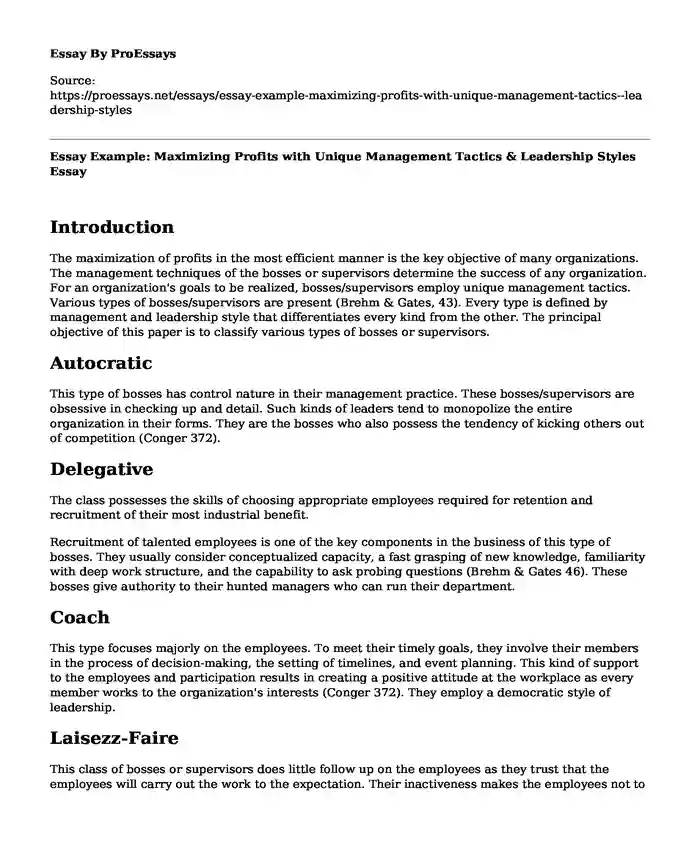Introduction
The maximization of profits in the most efficient manner is the key objective of many organizations. The management techniques of the bosses or supervisors determine the success of any organization. For an organization's goals to be realized, bosses/supervisors employ unique management tactics. Various types of bosses/supervisors are present (Brehm & Gates, 43). Every type is defined by management and leadership style that differentiates every kind from the other. The principal objective of this paper is to classify various types of bosses or supervisors.
Autocratic
This type of bosses has control nature in their management practice. These bosses/supervisors are obsessive in checking up and detail. Such kinds of leaders tend to monopolize the entire organization in their forms. They are the bosses who also possess the tendency of kicking others out of competition (Conger 372).
Delegative
The class possesses the skills of choosing appropriate employees required for retention and recruitment of their most industrial benefit.
Recruitment of talented employees is one of the key components in the business of this type of bosses. They usually consider conceptualized capacity, a fast grasping of new knowledge, familiarity with deep work structure, and the capability to ask probing questions (Brehm & Gates 46). These bosses give authority to their hunted managers who can run their department.
Coach
This type focuses majorly on the employees. To meet their timely goals, they involve their members in the process of decision-making, the setting of timelines, and event planning. This kind of support to the employees and participation results in creating a positive attitude at the workplace as every member works to the organization's interests (Conger 372). They employ a democratic style of leadership.
Laisezz-Faire
This class of bosses or supervisors does little follow up on the employees as they trust that the employees will carry out the work to the expectation. Their inactiveness makes the employees not to be in apposition to learn from them (Conger 373). Thus, making it a high risk to work with such bosses or supervisors unless an employee has research skills knowledge. As a result, the employees should be determined and independent to help in the achievement of what they want.
Control Freak
The class has the need to always being in the loop of what happens. In this type, the staff members are not being involved in shots calling. The employees working under this supervisor must understand how to handle them through constant information flow assurance on the progress of their project. Inquisitive questions usually enlighten them and thus giving them a vivid image of their expectations upon their holding knowledge of power.
Mentor
Having a deeper understanding of the profession of an employee is a critical requirement for the provision of direction and guidance in their careers. It is useful when the supervisor or the boss becomes responsible for mentoring the employees. This type of supervisor influences the employee's career development significantly, thus making them easy to work with. They adopt a transformational leadership style (Brehm & Gates, 50).
Team Player
They contain the truthful and competent role of employees by taking them into their accounts. They can get their staff on various ideas when making tough decisions and open up for them without insulting others (Conger 374). They know that objectives are shared with employees, for their success relies on the staff and vice versa. Credit is given where it is due; thus, it is considered the type of boss to work with.
Conclusion
In summation, people must understand that every organization has objectives to achieve. Hence, the type of boss's or supervisor's nature that employees learn from to work on setting goals is vital.
Works Cited
Brehm, John, and Scott Gates. "Supervisors as trust brokers in social-work bureaucracies." Trust and distrust in organizations: Dilemmas and approaches (2004): 41-64.
Conger, Stuart. "Fostering a career development culture: Reflections on the roles of managers, employees, and supervisors." Career Development International (2002).
Cite this page
Essay Example: Maximizing Profits with Unique Management Tactics & Leadership Styles. (2023, Nov 02). Retrieved from https://proessays.net/essays/essay-example-maximizing-profits-with-unique-management-tactics--leadership-styles
If you are the original author of this essay and no longer wish to have it published on the ProEssays website, please click below to request its removal:
- Essay Sample on Neuromarketing
- Is Luxury Kids Market a Way of Diversification of Luxury Brands?
- Competition in the Hotel Industry Essay Example
- The Rhetorical Analysis Paper on Gun Control Ad Titled "No More Silence"
- Essay Sample on DaVita's Strategy: Attention to Detail, Teamwork and Compensation
- Ads Per Day: How Many & How Long? - Essay Sample
- Paper Sample on Benchmarking: Management Process for Continuous Improvement







